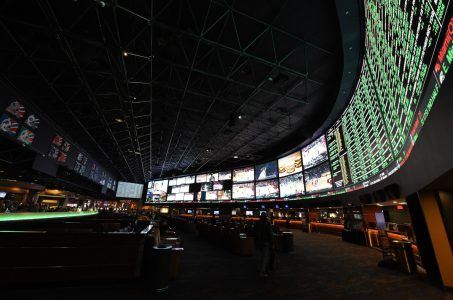Train Service Likely To Resume Between Thailand and Cambodia’s Gambling Destination of Poipet
Posted on: April 30, 2019, 12:54h.
Last updated on: April 30, 2019, 12:54h.
Poipet Cambodia — which now has some 22 casinos — may be easier to travel to for foreign visitors with plans to provide rail service from Thailand, helping to boost gambling revenue for the region. The city just three years ago had nine gaming venues, according to The Bangkok Post.

Regular rail service between Thailand’s Aranyaprathet and Poipet should resume soon, officials said this week. It was 46 years ago when passenger trains last ran between the two cities.
Tracks were heavily damaged during Cambodia’s violent civil war during the 1970s. Back then, Poipet was a destination for many Cambodians fleeing the deadly oppression orchestrated by the Khmer Rouge. Refugees stopped at the city as they made their way into Thailand.
Cambodia has since been rebuilt and is now ruled by a different government.
Located some 249 miles from the Thai border, Poipet is the nation’s runner-up to Sihanoukville as a gambling center.
Poipet casinos are mostly located near the Thai border or on an in-town commercial strip. Locals are prohibited by law from entering the casinos.
Thailand Residents Use Cambodian Casinos
Already, between 2,000 and 3,000 Thailand residents visit the city each day to use the casinos. The area benefits too from China’s interest in investing there.
The Post recently reported that between 8,000 and 10,000 Chinese live in Poipet. Many are employed in the construction or gambling sectors.
Some even reside there temporarily as they patronize the casinos. About 10,000 Cambodians and more than 1,200 foreigners, mostly Thais and Chinese, work in the casino sector there.
In 2014, the city’s population was approximately 80,000 and is now approximately 120,000. Many of the new residents are from China.
Sihanoukville, a coastal city southwest of the nation’s capital of Phnom Penh, has some 86 casinos. There are about 200,000 people living and working there, including approximately 70,000 Chinese nationals.
Ros Phirun, Cambodia’s deputy director-general of the Ministry of Economy and Finance, said there are currently 163 casinos nationwide. They generated approximately US$56 million for the government last year. Tax revenues on gambling are predicted to total $70 million in 2019, Phirun adds.
Last year, Phnom Penh’s NagaWorld raised about 40 percent of the total tax revenues, and casinos in Poipet provided the government with 22 percent. The balance came from casinos located elsewhere.
NagaWorld, owned by Chen Lip Keong of Malaysia, made a net profit of $391 million in 2018, an increase of 53 percent over 2017, news reports said. It had $1.4 billion in gross gaming revenue in 2018. That is an increase of 55 percent over 2017.
NagaCorp soon may undertake a $4 billion expansion of its existing exclusive casino operations in Phnom Penh.
Officials say rail service will also eventually run between Phnom Penh and Bangkok.
Mass Transit to Macau
Tourists and gambling patrons from mainland China increasingly use public transportation to get to Macau, a major gambling center. Buses provide daily service from casino resorts in Macau to Hong Kong via the new Hong Kong-Zhuhai-Macau (HKZM) bridge.
Additionally, a high-speed rail line from Guangzhou South Railway Station is used to carry passengers to Zhuhai Railway Station, near Macau. Buses then take passengers from the station to Macau destinations.
Problems with Casinos
But there are concerns over gaming venues rapidly expanding in Cambodia. It has led to environmental hazards. There also are worries about money laundering and other crimes, given the large amount of funds being used in the venues and a relatively lax regulatory environment.
Sometimes, gambling-related incidents have become violent. Last December, authorities in Cambodia arrested nine Chinese nationals for the kidnap and torture of two gamblers in Sihanoukville. In April, casino staff in Sihanoukville were accused of beating eight Chinese gamblers suspected by casino management of cheating.
The last major effort in Cambodia to beef up casino regulations was in 2017. The move followed a US State Department report that described the country’s casino sector as “unregulated or under-regulated,” a designation that likely kept away American casino operators.
Related News Articles
Niagara Fallsview Casino Theatre Proposal Would Block Views of Falls
Westgate SuperBook to Expand Brand Across US In Post-PASPA America
Most Popular
Mirage Las Vegas Demolition to Start Next Week, Atrium a Goner
Where All the Mirage Relics Will Go
Most Commented
-
Bally’s Facing Five Months of Daily Demolition for Chicago Casino
— June 18, 2024 — 12 Comments















No comments yet